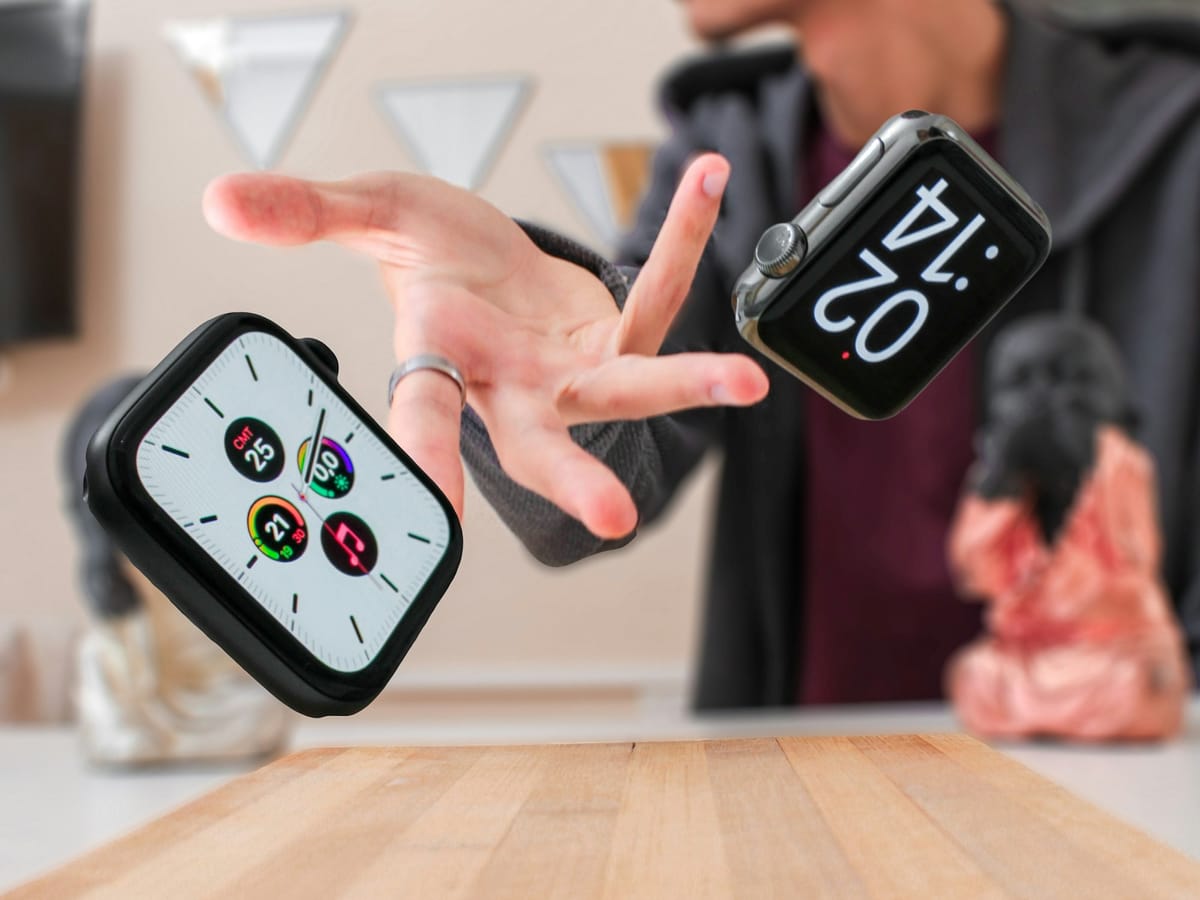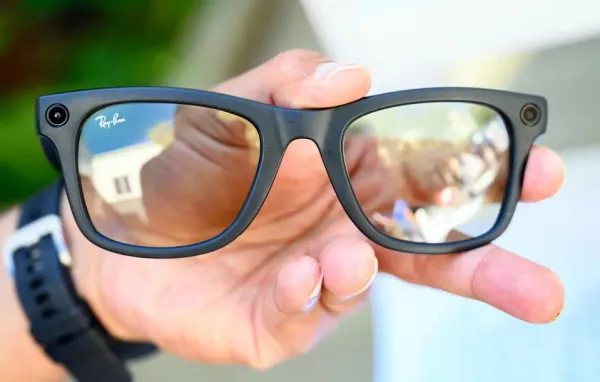Health Wearables Can Have Unintended Side Effects
What happens when we become over aware of our bodies?

It's safe to say that technology has now merged with us and I no longer believe that we are separate from technology. Between our smartphones and now wearable technologies, we are essentially cyborgs who offload various parts of ourselves to something not human. So the question I am left with is, is this a bad thing or a positive advancement?
The average American smartphone user reaches for their device 352 times per day. If you don’t believe me, just look around the room the next time you are somewhere like a coffee shop, a waiting room, or if you are a parent, at one of the many kid events you need to attend. Everyone is glued to their device whenever they get a spare moment and you probably are too. Some people are on their devices for important things like work, and others are just trying to pass the time and some might not even be conscious they are on their device.
I have been trying to cut down on my own device time, and I find myself phantom reaching for my phone even though I deleted most of the interesting apps. Often, I pull it out and stare, wondering why the heck I am looking at it. My favorite is when I go to check the time and then after I put my phone away, I still don't know what time it is.
We aren’t just addicted to our phones, a huge number of us now use wearable technology for various reasons, mostly because the marketing campaigns behind them are really good. Why would you not want to be healthier and know what is happening to your body 24/7? I was sucked into purchasing a 'Whoop' fitness wrist wearable because I wanted to get healthier and be more aware of my body and my sleep, but honestly, all it ended up doing was making my mental health so much worse, which then made my physical health worse.
But before we get into that story.
Let’s take a look at how many people are using wearable technologies to set the stage
- From 2016 to 2019, connected wearable devices increased by 325 million to 722 million respectively.
- From 2019 to 2023, the number of wrist wearable devices was predicted to rise from 66.5 million units to 105.3 million, respectively.
- The number of health wearables sold worldwide in 2019 was 223 million.
- The sale of smartwatches rose from 9 million units in 2016 to 22 million in 2020 in the US.
- The total number of users of wearable devices in 2024 is estimated to be over 1 billion.
So, what’s the problem?
It turns out your body is pretty incredible at telling you what you need and how you are feeling. It is constantly trying to communicate with you but most of us have no idea how to listen to it anymore or were never taught. When you wake up feeling drained, have a headache, or your body hurts, you can probably easily relate it to drinking, staying up late, or pushing it too hard in your last workout. Your body is pretty obviously telling you that you did something wrong. But there are a lot more subtle communications your body is trying to have with you which only become obvious when you start tuning in.
So for those using wearable tech, what happens when you wake up feeling awesome, but your device is telling you that you didn’t sleep well, your internal metrics are off, and oh, by the way, your stress levels while you were sleeping were high?
Well, for me, since I didn't know how to tune in yet, I immediately went from feeling great to feeling like crap to worrying about why my metrics were all wrong, even when I didn’t do anything ‘bad’ the day before. It led me to get anxious about my body. I started to think about heart issues, breathing issues, or a list of so many other ailments that I most likely didn’t have. My mornings turned into me frantically opening my Whoop app, waiting for it to process, and then crossing my fingers that I would be in the green today so I wouldn’t have to worry that something was wrong with me.
Have you heard of a placebo?
I am assuming you all know about the placebo effect and if not, you know how you feel when you run into someone and they say, “Wow, you look tired,” or “Wow, do you look stressed.” Well, I wasn’t until you pointed it out, thanks!
Some of you also might have read the incredible studies that show the power of the placebo effect, but if you haven’t, here are some quick highlights.
- The placebo effect can involve the release of neurotransmitters and hormones that interact with the body to cause physiological changes, like changes in blood pressure, heart rate, and blood test results
- Specific brain regions are activated or deactivated when someone experiences the placebo effect for pain relief.
- Factors like branding, pill color, and medical procedures can amplify the placebo effect. For example, placebo injections tend to be more effective than placebo pills. In one study, patients with Parkinson’s disease showed greater symptom improvement from a “placebo brain surgery” than from the actual stem cell treatment
- The placebo effect can enhance physical and cognitive performance beyond just pain relief. Studies have found placebo effects boosting creativity, learning, speed, strength, and endurance in tasks like cycling.
In summary, our thoughts and our bodies are so much more powerful than we all think and give them credit for.
For me, owning a health device like the Whoop completely severed my intuitive connection with my body. It put me completely in my head instead of actually checking in with my body’s needs, it was basically a negative placebo for me. It didn’t help when I came across a post on Reddit where someone was able to use the Whoop to alert them that they might be having a heart attack. I do have a history of obsessive thoughts, which I put a lot of effort into minimizing, but the only thing I could think of if my metrics were off or my heart rate variability dropped was that I was going to have a major medical issue. It didn’t help on the days that I had a rib out in my back from carrying my kids, so I had chest pain and metrics that were in the red. Guess what? I was and am completely fine, but my mind was convinced otherwise, and my health was starting to decline because of it. My blood pressure was elevated, my sleep was suffering, I was fatigued and felt weak, and I was even starting to think a lot more about death and general thoughts around mortality.
I remember one day, I woke up to find that my Whoop recovery was at 1% — extreme red. I had never dropped below a 45% recovery before. My heart rate variability had plummeted, my respiratory rate while sleeping was elevated, my body temperature was elevated, and my stress level was ‘high’ the entire night. I felt okay, not great that day, just a bit drained, but seeing these metrics, I immediately started to panic. “I must be dying.”
I had the shittiest day, filled with panic and anxiety. I felt so bad by the end of the day, and it turns out I probably had a mild virus. This was the tipping point for me, and I immediately stopped using the device. Why did I need this stupid device? Can’t I just listen to my own intuition and my own body to decide how I should feel? Unfortunately, they locked me into a year subscription, but that is just my loss at this point and not worth continuing.
I have been wearable free for about 6 months now and I am feeling so much better. I have also been putting in the effort to reconnect with my body through meditation, journaling, and other holistic practices. At this point, it feels so odd that I would need a wearable device at all.
Is there a place for wearable health tech?
I do think there can be a place in people’s lives for technology like wearables to be used as a crutch or an aid, but it can’t be the end goal or primary motivator. If you are a pro athlete pushing the boundaries of your body, well this post is not really for you.
However, like everything it comes down to your intentions. If your Apple Watch is the reason you are getting up and going for a walk every day, then that is great, but I challenge you to start doing this for yourself because your intuition is telling you that your body needs movement, and because you are excited at the prospect of getting healthy. If you need an external device to get yourself to exercise or to get healthier, then this is a sign you need to do the work to start connecting with yourself again. I have been wearable-free for quite some time now, and I still get strong urges to go for a walk, go climbing, or go jump on the rowing machine. I want to do it, it feels like the right thing to do, and when I don’t, I can feel the agitation in my body.
Maybe some of you are like my wife where she is literally lying down beside me on the couch and her Apple Watch sends her a “Congratulations, you hit your stand goal for the day!” notification or the nights when she hasn’t closed all her rings, so once again, as she is laying on the couch, she is shaking her arm all over the place so the rings can be closed for the day. If this brings you joy, then I won’t take that from you but I think we can say that these devices have successfully taken over our dopamine systems and the marketing is working, not that these devices are making us healthier. Not to mention there are countless studies showing how inaccurate "calories burned" or "steps taken" measurements are and could also lead to a negative placebo.
And here comes AI to the party...
I can’t help but worry about how AI is going to take over all intuitive thinking when it comes to your health, your body, and your mind. AI will soon be integrated into these devices and will be able to constantly monitor all your bodily functions and tell you what to do and when to do it. You really won’t need a connection to your body anymore, and I think this will spell disaster for your nervous system and anxiety and depression diagnoses. Will it save lives by detecting early warning signs? Yes, most likely it will. Will it have an overall negative impact on the human experience or mental health issues? Well, that remains to be seen.
AI in its current form is not reliable enough to monitor people's health on its own, and we could find these devices prematurely flagging false negatives and causing more people to suffer. We won’t get into the privacy implications of AI health monitoring and how they could impact health and life insurance in the future. That’s something for a different article.
So I will leave you something to chew on. When these devices get so powerful they can tell you your exact expiration date, the day you are going to die, would you want to know? Or does the act of measuring your mortality change the outcome?




